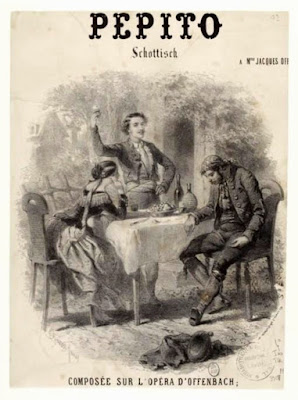This week, I was sent a review copy of a collection of essays, or 'papers' as they are called by the learned, which have more (or occasionally less) to do with the works of the composer, Jacques Offenbach ...
OFFENBACH, EUROPEAN MUSICIAN or, put away the sellotape
"It’s the two-hundredth birthday of composer Jacques Offenbach this week, and, all round the globe, lovers of his wonderfully sparkling music have been marking the occasion with productions of his stage works, large and small. The event has also provided those whose world is the written page, rather than the performing stage, with the opportunity to wade into print with lucubrations, equally large and small. I’ve seen only a few of these, and I think that the stage productions (which, alas, have not reached New Zealand) have probably got it all over them. Well, they ought to have. You can listen to Ba-ta-clan or Orphée aux enfers or their confrères a hundred times, and never tire of them. But after the first really well-researched and knowledgeable books and articles on the musician and his works had been published, well, what more was there to say and write? As a result, the same material has, largely, been repeated or copied, over and over again. Errors sometimes included! Of course, this is the twenty-first century, where footnotes are considered more important that facts; the heyday of ‘theorising’ rather than fact-finding … but I’m ‘of an earlier age’, I like my first-hand facts, so, when the theses are flying, I keep my head down. And, thus, I haven’t clambered on to the Offenbach bandwagon of 2019. What could I say, that Jean-Claude Yon, for example, couldn’t say better?" (Gänzl 2019).
Well, a bundle of other folk didn't share my reticence, and the result is a 400-page book of articles -- some wonderfully and fascinatingly fact-finding, others the usual university seminar waffling -- put out by the splendid Palazzetto Bru Zane, the 21st century's French musical Maecenas, under the direction of precisely the self-same M Yon and two German colleagues, MM Jacobshagen and Schwarz.
Like any anthology, this collection has parts that are going to appeal to a particular reader, of whatever tastes, and parts that ar'n't. All I can say is that there are more than enough Really Grand Bits for Me, herein, for this book to go on to my 'keep within reach' shelf, after I've sellotaped the meaningless pages together. Yes. Sellotape. Like cuts in an orchestral score. It's a super system with curate's-eggy anthologies.
So, which bits am I keeping sellotape free? Mostly, the ones that deal with the music rather than the libretti and librettists. The ones that tell me something I didn't know. The ones that have actual information, or reference value, rather than just common-room chatter ...
Footnotes, by the way, have me reaching for the sticky paper ...
In I dove. Page one. Matthias Brzoska's piece on the early La Duchesse d'Albe was the first delightful discovery, Mark Everist's history of the little Offenbach pieces at the Salle Herz, a positive treasure, and essays such as Roxane Martin's on Offenbach at the Comédie Française, Richard Sherr's on Pépito, and Emanuelle Delattre-Destemberg's on Le Papillon ('Mlle Stoikoff' was named Augustine) got the collection off to a brilliant start. If, for me, it got a little too theoretical and universitorial thereafter, the gems still surfaced regularly through the remaining pages -- the piece on the use of Offenbach's music in the scores at the Châtelet (shame that Britain is not regarded as Europe, this article would have doubled in size), the contemporary reactions to Offenbach's death compiled by Arnold Jacobshagen ...
 |
| Emma Livry in Le Papillon |
There was one article I skipped. It began 'En 2019 l'année du bicentenaire de la naissance d'Offenbach, les études et recherches à son sujet se concentrent encore trop sur les aspects biographiques ou sur l'analyse historique ...'. Trop? Trop?? There follows 'un examen analytique de la musique offenbachienne'. Pulling the wings off a papillon? It must be a thesis.
Back on form with Stephanie Schroedter's (over-footnoted) piece on dance, and after skipping a piece which mentions Freud in line 2 ... ah ha! here comes the light relief! Kevin Clarke with his porno history of opérette. Kevin (who is the only contributor to this volume whom I know personally) is always good value, and goodness I even get mentioned in his essay. Wouldn't you know?: the one chapter in which I make an appearance (four times!), is the one on pornography!
There are really splendid (if, again, over-footnoted) pieces on Offenbach productions in Portugal (Mário Vieira de Carvalho) and Spain (Serge Salun), -- alas poor Hungary! -- and, on pages 316 -334 my favourite piece of all: Laure Schnapper's truly important article on the dance arrangements of the composer's work.
So you see, I didn't need my sellotape too much at all. I just skipped the bits with too many buzzwords, with too much evidence of second-hand use or the university essay, with too many footnotes (which I didn't look at, anyway) and I had an absolutely rippingly good time wallowing in the items I've named above ...
So, in summary, OFFENBACH, MUSICIEN EUROPÉEN is a decidedly valuable anthology for its predominant Brilliant Bits, and it just remains for me to say "bravo Bru Zane ... once again" ... what's next?
PS When I decided, in 2019, not to tread on the sacred lawns of Offenbachian 'scholarship', I turned instead to the performers of little Jacques's early works. You can read (and, please, add to or correct) the result here https://kurtofgerolstein.blogspot.com/2019/06/ladies-of-bouffes-parisiens-1855-1860.html





No comments:
Post a Comment